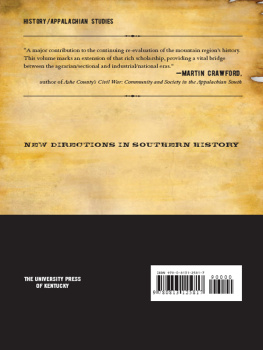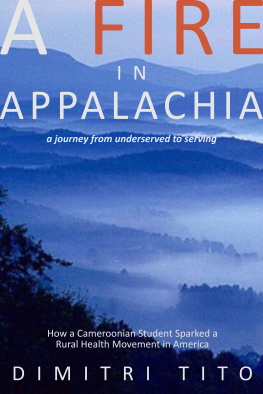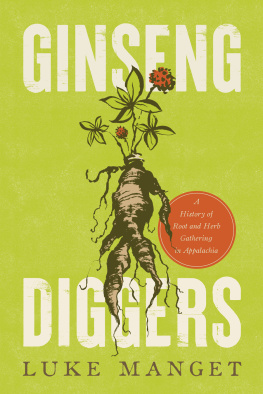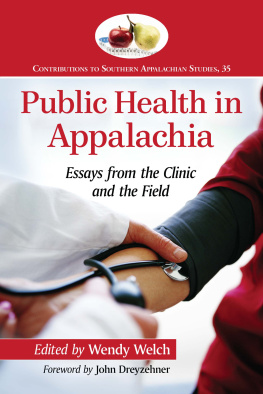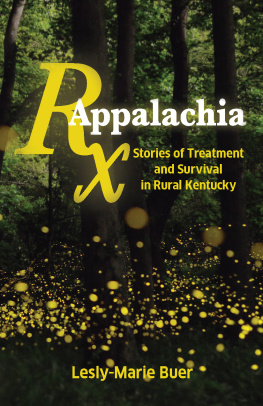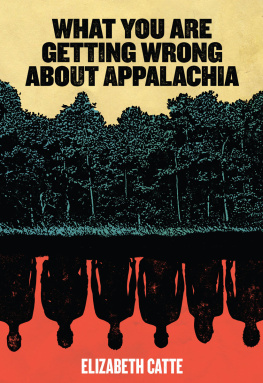N EW D IRECTIONS IN S OUTHERN H ISTORY
Series Editors
Peter S. Carmichael, West Virginia University
Michele Gillespie, Wake Forest University
William A. Link, University of Florida
The Lost State of Franklin: America's First Secession
Kevin T. Barksdale
Bluecoats and Tar Heels:
Soldiers and Civilians in Reconstruction North Carolina
Mark L. Bradley
Becoming Bourgeois: Merchant Culture in the South, 18201865
Frank J. Byrne
Cowboy Conservatism: Texas and the Rise of the Modern Right
Sean P. Cunningham
Lum and Abner: Rural America and the Golden Age of Radio
Randal L. Hall
Entangled by White Supremacy:
Reform in World War Iera South Carolina
Janet G. Hudson
The View from the Ground: Experiences of Civil War Soldiers
edited by Aaron Sheehan-Dean
Southern Farmers and Their Stories:
Memory and Meaning in Oral History
Melissa Walker
Law and Society in the South:
A History of North Carolina Court Cases
John W. Wertheimer
RECONSTRUCTING
APPALACHIA

THE CIVIL WAR'S AFTERMATH

EDITED BY ANDREW L. SLAP
Introduction by Gordon B. McKinney
THE UNIVERSITY PRESS OF KENTUCKY
Copyright 2010 by The University Press of Kentucky
Scholarly publisher for the Commonwealth,
serving Bellarmine University, Berea College, Centre College of Kentucky,
Eastern Kentucky University, The Filson Historical Society, Georgetown College,
Kentucky Historical Society, Kentucky State University, Morehead State University,
Murray State University, Northern Kentucky University, Transylvania University,
University of Kentucky, University of Louisville, and Western Kentucky University.
All rights reserved.
Editorial and Sales Offices: The University Press of Kentucky
663 South Limestone Street, Lexington, Kentucky 405084008
www.kentuckypress.com
Maps by Dick Gilbreath, University of Kentucky Cartography Lab.
14 13 12 11 10 5 4 3 2 1
Library of Congress Cataloging-in-Publication Data
Reconstructing Appalachia : the Civil War's aftermath / edited by Andrew L.
Slap ; introduction by Gordon B. McKinney.
p. cm.(New directions in southern history)
Includes bibliographical references and index.
ISBN 978-0-8131-2581-7 (hardcover : alk. paper)
1. Appalachian Region, SouthernHistory19th century. 2. Appalachian Region, SouthernSocial conditions19th century. 3. Appalachian Region, SouthernEconomic conditions19th century. 4. Reconstruction (U.S. history, 1865-1877) 5. United StatesHistoryCivil War, 18611865Influence. 6. United StatesHistoryCivil War, 18611865Social aspects. I. Slap, Andrew L.
F217.A65R43 2010
973.8dc22 2009053154
This book is printed on acid-free recycled paper meeting the requirements of the American National Standard for Permanence in Paper for Printed Library Materials.

Manufactured in the United States of America.

Member of the Association of
American University Presses
Acknowledgments
The idea for this project first emerged at a Friday afternoon social gathering of colleagues in the history department at East Tennessee State University (ETSU). During the gathering, I casually commented that I could put together an anthology on Appalachia during the Civil War era. Stephen Fritz, a senior member of the department who is usually jovial in social settings, suddenly became serious and told me that was the kind of idea junior faculty should follow through on and not just discuss. I dutifully thought about the idea for the rest of the afternoon, and that evening I called Bob Sandow to get his thoughts. Bob and I talked for more than an hour that Friday evening, after which I e-mailed Pete Carmichael to see if he would be interested in such a project for his series at the University Press of Kentucky. Pete was enthusiastic from the start, and by Monday morning Joyce Harrison, an acquisitions editor at the press, had contacted me. Bob, Pete, and Joyce all helped me conceptualize this project as a sequel to Kenneth W. Noe and Shannon Wilson's seminal Civil War in Appalachia: Collected Essays, focusing on the Civil War's aftermath in Appalachia.
My original inspiration for a collection on Civil Warera Appalachia came from the historians who had given talks at the ETSU Civil War Speakers Series, which I started upon arriving at ETSU. Many of the Civil Warera historians in the area naturally focused on Appalachia; Bob Sandow, Anne Marshall, Mary Ella Engel, and Steve Nash were among the numerous historians to give a lecture in the series over the years. The ETSU history department and the Center for Appalachian Studies and Services jointly sponsored these lectures, and center director Roberta Herrin has always been enthusiastic about the series. Dr. Robert and Norma Clark's generous support of the history department has helped make the lecture series possible and thus has directly contributed to this volume. Bob Clark has also audited nine of my courses, including every graduate seminar I have taught, and has improved them all with his keen reading and sharp questions.
It has been a pleasure to work with the University Press of Kentucky in the production of this book. Stephen Wrinn and Anne Dean Watkins quickly dispelled any worries I had when Joyce left the press. Steve and Anne Dean took over the project and did a great job of encouraging me and keeping the project on time. The press also picked good readers for both the proposal and the manuscript. Martin Crawford, Ken Noe, and the anonymous reader all saw promise in this project and offered constructive criticisms that made it better.
I am neither an Appalachianist nor an Appalachian. Thus, at every stage of this project I have been struck by how welcoming and generous Appalachian historians have been to a newcomer to their field. I appreciate the contributors interest in this project, and getting to know and work with them has been a pleasure. They were extremely patient with a novice editor. I particularly want to thank John Inscoe for his advice on editing a collection of essays and his meticulous reading of my chapter in this volume.
In my six years at ETSU, I have started learning about Appalachia. Some of this education has come from my students, but I have also benefited from being academic director of the local Teaching American History Grant, awarded by the U.S. Department of Education. The grant has enabled me to meet hundreds of area schoolteachers and to travel throughout the region. While beginning work on this volume, I decided that one of the grant's summer institutes for teachers should focus on Altina Waller's wonderful Feud: Hatfields, McCoys, and Social Change in Appalachia, 18601900. Besides just reading and discussing the book, I wanted the teachers and myself to experience the places and the environment viscerally. Grant director Deborah Montanti encouraged me to follow the vision, and Kevin Barksdale made it possible, taking us on an amazing two-day trip to Matewan, Beckley, Bramwell, and Pocahontas. Kevin, with the help of Paul Lutz and Bill Richardson, enabled us to experience Appalachia in a way few outsiders can. One of the highlights was sitting in rocking chairs on the porch of our hotel in Beckley and listening to upper East Tennessee school teachers discuss the nature of Appalachia. It has become a clich that research informs teaching, but the combination of my experiences with the Teaching American History Grant and working on this project have certainly improved my understanding of the students at ETSU and thus my teaching.

